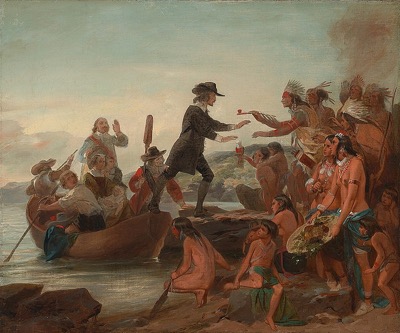TheRhodeIsland

Alonzo Chappel: The Landing of Roger Williams in 1636 (1857)
"As tiny as that measure might seem, it's far too large to calculate any human affect …"
The standard calibration for natural disasters in the United States has long been TheRhodeIsland. Whether measuring hurricane or hail damage, government agencies as well as our print and broadcast media exclusively employ TheRhodeIsland as the universal unit of measure of size. True devastation rarely affects less than a single Rhode Island-sized area, and seems to often spread into dozens, occasionally scores. To clarify, TheRhodeIsland represents an area equivalent to the square mileage encompassed by our former colony and tiniest state, which roughly equals the size of a typical ex-urban McMansion estate, or, one Ponderosa, that fictional ranch featured in the sixties western television series, though both The McMansion and The Ponderosa feature far less distinct boundaries than TheRhodeIsland. In spite of this state enjoying the representation of two US Senators, it features fewer bathrooms than the typical McMansion. Fun Fact: It was also the birthplace of the most radical concept in governance ever to visit this continent, or, indeed, the world: Tolerance, a practice now long fallen into regrettable disuse. ©2020 by David A. Schmaltz - all rights reserved
Oregon ignites, and the resulting wildfire consumes several Rhode Islands overnight. To be fair and accurate, Oregon could easily contain a multitude of Rhode Islands, and I always come to feel this unit of measure somewhat alarmist. Anything calibrated as the size of an entire state quite naturally seems as though it must be enormous, but Rhode Island is and always was tiny, much smaller than the area of even a standard mid-sized city. I saw last week, a novel calibration reporting that a fire had consumed a Connecticut, a much larger area, perhaps a few dozen Rhode Islands, but even Connecticut, by western standards, seems rather small, county-sized in Montana. Western states are the sort of places where even if one exceeds already outrageous speed limits all day, you're still sleeping within the same borders two night running. Sizes larger than the standard neighborhood tend to be unimaginable for most people, with vastness beginning just the other side of town, so I deeply doubt that any unit of measure really helps any of us get our heads around such magnitudes. We remain rather like the ancient Egyptians, who considered unimaginable any number above a scant thousand, and represented these with an astounded man glyph.
Roger Williams, purported founder of our sacred unit of measure, included tolerance in its charter, though he consequently spent many of his following days trying to cogently explain the concept, for the world had never before considered it. Tolerance, he'd patiently explain, means that we don't have to agree on anything to peacefully co-exist. It's nobody's job to reform or correct belief. Under his notion, Antifa and QAnon could lie down together in a meadow like the proverbial lion and lamb. I could secretly hold you in contempt, yet still tolerate your presence. No need, he'd plead, to evangelize or convert. He claimed to hate all Muslims and also insisted that he'd defend to his death their freedom to worship as they pleased. We could use a few Rhode Islands of those sentiments today, as intolerance seems to have scorched this land more thoroughly than could any raging wildfire. When, I often wonder, did it become anybody's cardinal sin to oppose fascism? It seems we could really, desperately use a few Roger Williamses influencing us these days. I imagine a sort of conflagration of the present status quo where instead of devastation, tolerance remains in its wake, and measured in some number of Roger Williams-worth of influence left behind. Film at eleven.
Once they roll out TheRhodeIsland, not even FEMA's gonna have much influence on recovery. A train load of Heckuva Job Brownies will very likely simply embarrass themselves with their government's response. People will be overwhelmed by loss for a while, grippy and complaining, wondering where their backstop went, and recovery will very likely never be an option. When wildfire ran through Los Alamos, New Mexico twenty years ago, I spoke with a man who'd lost his house. He recounted the few items he recovered after the flames had melted his car's tire rims into silvery puddles, the total of which amounted to a small box full. He volunteered to serve on a committee overseeing insurance company dealings with the devastated, and came to begrudgingly understand that he'd not lost his home, but his house. No insurance could ever cover the loss of a home, he reported, for it's designed only to cover houses and their contents. The home, he came to understand, lived somewhere inside him and was never dependent upon either the house or its contents. He went on to find a fresh house where he moved in his home. Neither loss nor recovery could ever be accurately calibrated by TheRhodeIsland. As tiny as that measure might seem, it's far too large to calculate any human affect, be it loss or tolerance.


